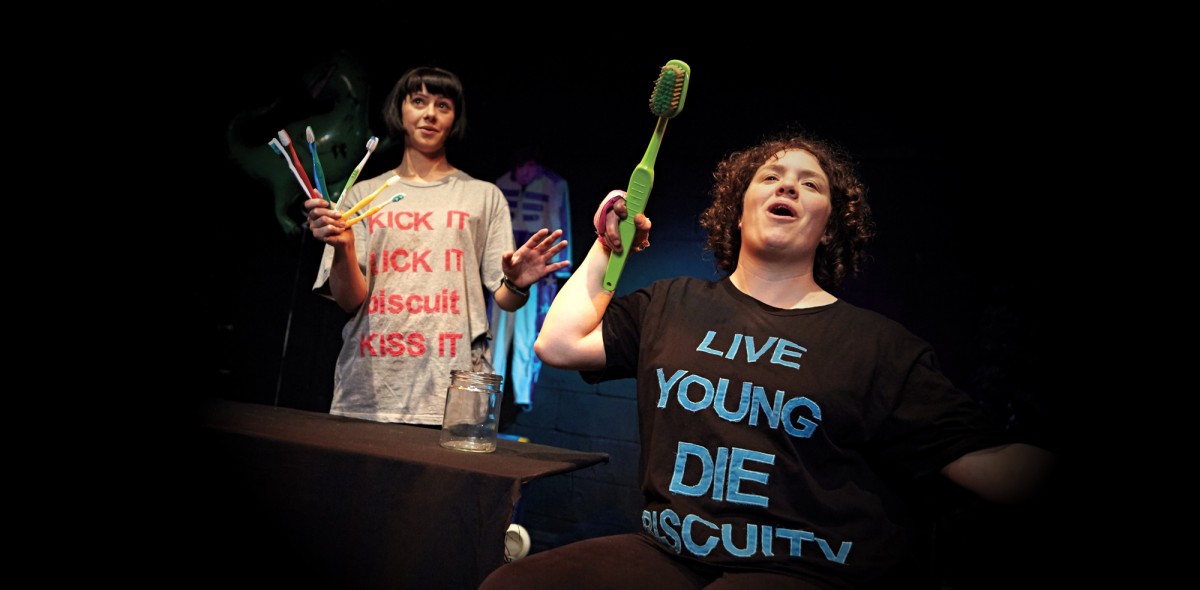Learning about Relaxed Performances with Jake Anthony
April 02, 2021

For World Autism Awareness Day, we were honoured to interview Jake Anthony to hear about his experience with Relaxed Performances.
Jake previously interviewed Accessible PuSh Coordinator Anika Vervecken to learn more about the concept of Relaxed Performances and how PuSh is planning to incorporate them in its accessibility plans moving forward.
During a Relaxed Performance, the traditional theatre etiquette is removed to make attending more accessible for people with light or sound sensitivity, autism and neurological disorders, as well as anxiety. A production where all performances are relaxed is referred to as Extra Live.
The PuSh Festival featured its first Relaxed Performance, which was also an Extra Live production — Backstage in Biscuit Land — at the Roundhouse Community Arts & Recreation Centre on January 30, 2017.
We remain committed to removing physical and financial barriers to attending cutting-edge contemporary arts and are excited to welcome as broad an audience as possible to experience PuSh performances.
How did you become passionate about theatre & the performing arts?
I was diagnosed as being on the autism spectrum when I was four years old. My mother had heard that acting, particularly ensemble theatre, was a great way for people with autism to learn how to connect with others, understand give-and-take relationships, study human emotion and be more in the moment. So, she enrolled me in my first ensemble theatre class. I ended up loving it and started taking regular classes at the Shadbolt Centre for the Arts. I found I wasn’t only becoming more social and connecting with people better, but that I was also really interested in developing my craft as an actor. I ended up studying acting all the way through college, graduating from the William Davis Centre for Actors’ Study at VanArts in 2012, as well as working as a professional theatre actor for fifteen years. I really owe my ability to work well with others, connect with and get to know new people, as well as feeling comfortable speaking in public to my journey in theatre!
Why are Relaxed Performances important for the arts sector?
Relaxed Performances make the performing arts accessible and enjoyable for audiences of all abilities! For people with “sensory sensitivities” (i.e. sensitivity to loud sounds, bright lights, etc.) Relaxed Performances make venues comfortable for them, where they can enjoy the show and not feel overwhelmed by their surroundings. The arts are for everyone, and these adapted performances ensure that anyone who comes to have a great experience in the theatre can do that!
Have you ever performed in a show that had a Relaxed Performance? How was that different as a performer?
I did a play called “Sequence” with Realwheels Theatre and Presentation House Theatre back in 2018, where we did a few Relaxed Performances during the run. This play’s really challenging for actors, especially since the really fast sound and lighting changes cue the start of all the scenes. Me and my castmates were a bit worried before the first Relaxed Performance that we might not hear a cue and start a scene late or miss a change in lighting because it was softer. We ended up having a really good time, especially since the audience didn’t have to follow the typical theatre etiquette rule of being as quiet as possible. The reactions we received from the audience gave us lots more positive energy and we had more fun. It was great to have the audience having a good time and us being able to hear them express that freely. After that, we really looked forward to the next Relaxed Performances!
What was your favourite reaction to a friend or another audience member to a Relaxed Performance?
In 2018, I was the Cultural Creative Consultant on the Arts Club Theatre Company’s production of “The Curious Incident of the Dog in the Night-Time”. This was the first Arts Club production to include Relaxed Performances in the run of a play. Working with the show’s director; Ashlie Corcoran, the rest of the production team, as well as an advisory committee made up of people with diverse abilities, I helped develop the Relaxed Performances. When my friend came to see the play with her son who has autism, she was amazed. She told me afterwards that she had never had the experience where both her and her son could enjoy seeing a play together. The sound and light cues not being so strong, as well as her son being able to get out of his seat and move around the theatre when he needed to, made it possible for them both to have a great time. This really touched me and made me appreciate the Relaxed Performance format even more.
For you personally, what’s the main difference between a Relaxed Performance and a performance following traditional theatre etiquette (a.ka. an “uptight performance”)?
I think the biggest difference is the freedom that Relaxed Performances offer audience members of all abilities. They can move around if they need to, leave the theatre if they’re feeling overwhelmed and if they need to make noises or talk to the person they’ve come to see the show with to calm themselves, they can. I know when I was younger, before Relaxed Performances were the norm, I used to get yelled at and have stuff thrown at me by other audience members when I’d go to see a show with my Mom. Even though that was completely unacceptable and cruel for them to do, all they could think was “Hey, this kid’s not being quiet like everyone else!” Relaxed Performances can help ensure that other audience members with diverse abilities don’t get targeted and treated this way when they come to see live performances.